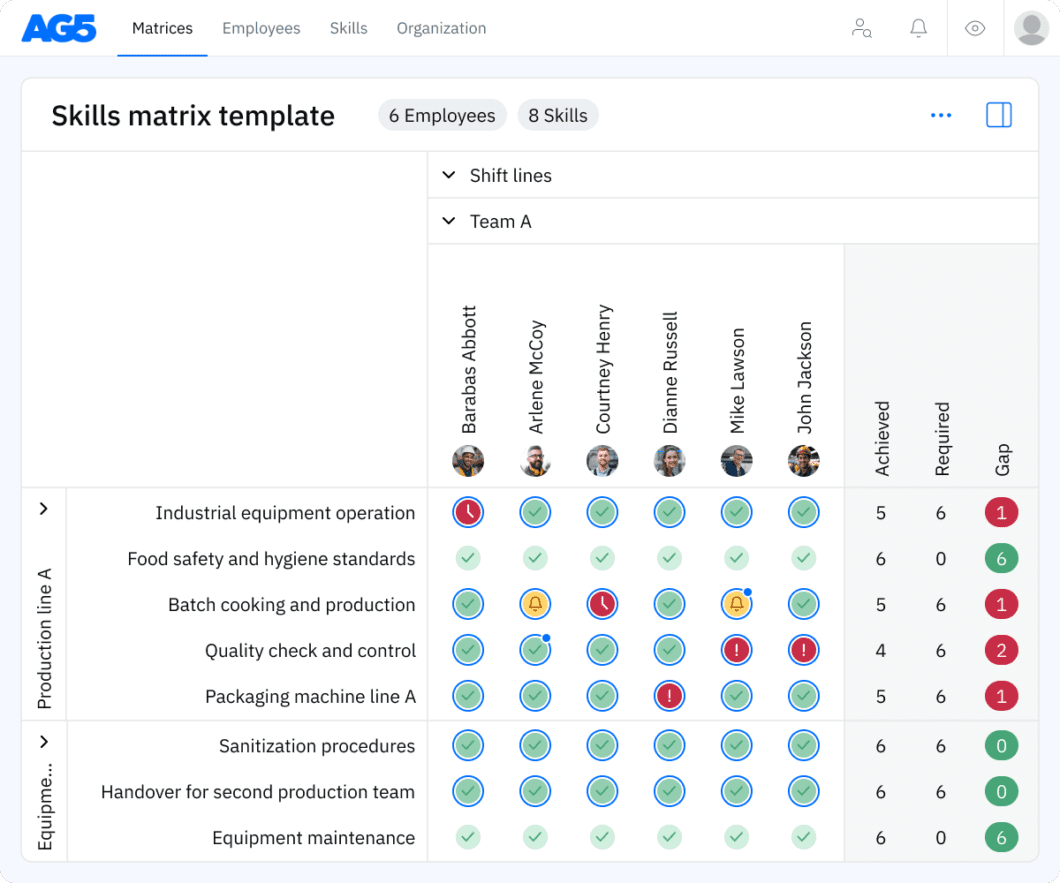Process capability skills matrix template
A skills matrix is a tool teams can use to effectively manage and assess their process capability skills and knowledge.
Download your free template here

Overview Copied
With our free process capability skills matrix template, you will receive a clear overview of the skills that are present in your organization, as well as those that are missing. Using this information, you can develop and implement a plan to ensure that your employees’ skills are up to date, comprehensive, compliant, and ready for the future.
Statistical process control (SPC)
- Understanding of SPC fundamentals (mean, variance, control limits)
- Identifying key process variables for monitoring
- Implementing and interpreting control charts (e.g., X-bar, R-charts)
- Analyzing process stability and variability
- Detecting and correcting out-of-control conditions
Process capability measurement
- Knowledge of process capability indices (Cp, Cpk, Pp, Ppk)
- Calculating Cp, Cpk, Pp, Ppk indices from process data
- Understanding the difference between short-term and long-term capability
- Interpreting capability indices to determine process performance
- Using statistical software (e.g., Minitab, JMP) for capability analysis
Data collection and analysis
- Setting up data collection plans for process capability studies
- Understanding sampling methods and sample size determination
- Collecting data from production processes
- Analyzing data distribution and normality tests
- Identifying process trends and variations
Process improvement and optimization
- Identifying areas for process improvement based on capability analysis
- Implementing corrective actions to improve process capability
- Using Six Sigma tools (e.g., DMAIC) to improve process capability
- Performing root cause analysis (e.g., fishbone diagram, 5 Whys)
- Monitoring the effects of improvements on process capability
Measurement system analysis (MSA)
- Understanding MSA fundamentals (repeatability, reproducibility, bias)
- Performing Gage R&R studies to assess measurement system capability
- Evaluating the impact of measurement error on process capability
- Implementing improvements in measurement systems
- Documenting and validating measurement system performance
Continuous monitoring and reporting
- Setting up continuous monitoring of process capability
- Developing process capability reports and dashboards
- Communicating capability findings to management and stakeholders
- Providing recommendations for process adjustments
- Tracking progress and performance over time
Training and competency development
- Training staff on process capability fundamentals and tools
- Conducting workshops on process monitoring and SPC
- Developing training materials for statistical analysis methods
- Ongoing professional development in process improvement techniques
- Ensuring competency in the use of data analysis software
Benefits Copied
Skills management software is important in process capability analysis as it helps organizations identify and track the skills of employees involved in measuring and analyzing process capability, ensuring they possess the necessary knowledge and statistical skills to assess process performance and identify areas for improvement.
Download the free Excel Process capability skills matrix template Copied
We also have a free Excel template available that you can download if you are not ready to get started with AG5. To download it, please complete this form here.
Author Copied
Revisions Copied
Tired of managing skills in Excel?
Say goodbye to Excel matrices. Start using AG5’s plug and play skill matrix software.
Recognized by G2 for Excellence in Skills Management

